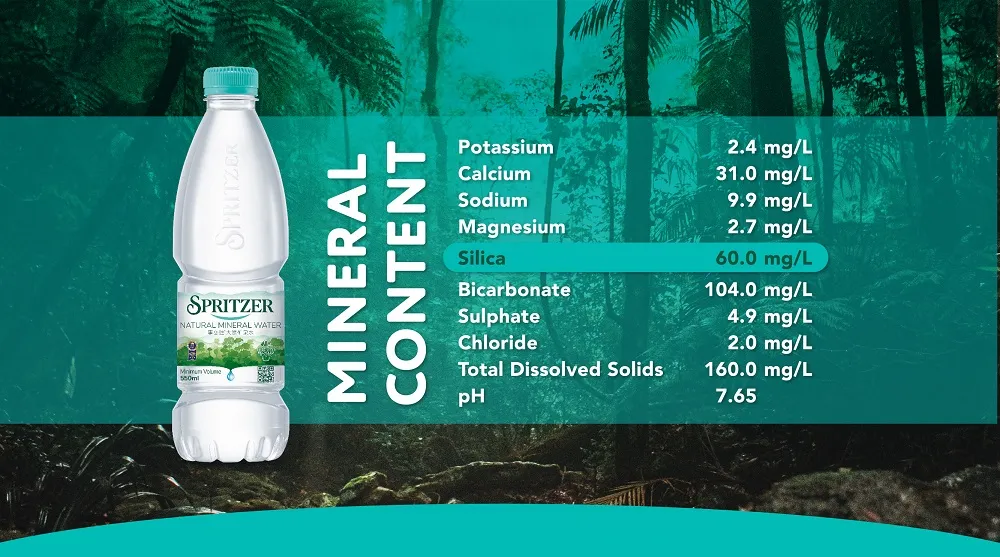
Contents
- 1 I. Introduction to Mineral Water
- 2 II. The Essential Role of Magnesium
- 3 III. Calcium: Building Strong Bones and More
- 4 IV. Other Key Minerals Found in Mineral Water
- 5 V. Health Benefits of Drinking Mineral Water
- 6 VI. Comparing Mineral Water to Other Beverages
- 7 VII. Choosing the Right Mineral Water
- 8 VIII. Potential Risks and Considerations
- 9 IX. Summary
- 10 X. FAQs
I. Introduction to Mineral Water
A. Definition and composition
Mineral water is more than just plain old H2O. It’s water that naturally contains various minerals like magnesium, calcium, and potassium. These minerals give the water its unique taste and potential health benefits.
B. Natural sources of mineral water
Mineral water comes from underground sources, like springs or wells. As it travels through rocks and soil, it picks up minerals along the way. Some famous mineral water sources include the springs of Evian in France and the wells of San Pellegrino in Italy.
C. Differences between mineral water and regular water
The main difference between mineral water and regular tap water is the mineral content. Tap water goes through treatment processes that may remove some minerals, while mineral water retains its natural mineral composition. This can affect taste, and potentially, health benefits.

Image source: Spritzer.com.my
II. The Essential Role of Magnesium
A. Magnesium’s functions in the body
Magnesium is like the unsung hero of our bodies. It’s involved in hundreds of biochemical reactions, from energy production to DNA synthesis. It helps our muscles and nerves function properly and keeps our heart rhythm steady.
B. Health benefits of magnesium from mineral water
Drinking mineral water rich in magnesium can be a tasty way to boost your intake. Some studies suggest it might help lower blood pressure, reduce the risk of heart disease, and even improve sleep quality. I remember when I started drinking magnesium-rich mineral water before bed, I noticed I was falling asleep faster!
C. Recommended daily intake and absorption rates
The recommended daily intake of magnesium is about 400-420 mg for men and 310-320 mg for women. Our bodies typically absorb about 30-40% of the magnesium we consume. Interestingly, the magnesium in water might be easier for our bodies to absorb than the magnesium in food.
III. Calcium: Building Strong Bones and More
A. Calcium’s importance in bodily functions
We all know calcium is crucial for strong bones and teeth, but did you know it also helps with blood clotting, muscle function, and nerve signaling? It’s like the body’s building block and communication facilitator rolled into one.
B. How mineral water contributes to calcium intake
Some mineral waters can be a good source of calcium. For example, a liter of certain calcium-rich mineral waters can provide up to 20-30% of your daily calcium needs. That’s pretty impressive for something that’s refreshing and calorie-free!
C. Balancing calcium with other minerals
It’s not just about getting enough calcium; it’s about balance. Magnesium helps calcium absorption, while too much sodium can increase calcium loss. Mineral water often provides a natural balance of these minerals.
IV. Other Key Minerals Found in Mineral Water
A. Potassium and its health benefits
Potassium is another mineral star. It helps regulate fluid balance, supports nerve signals, and may help lower blood pressure. Some mineral waters contain a decent amount of potassium, which can contribute to your daily intake.
B. Sodium: Necessary but in moderation
Sodium often gets a bad rap, but we do need some for proper bodily functions. The key is moderation. Some mineral waters contain sodium, which can be beneficial for replacing electrolytes after exercise, but it’s something to watch if you’re monitoring your sodium intake.
C. Trace minerals and their roles
Mineral water can also contain trace amounts of other minerals like zinc, copper, and selenium. While the amounts are small, these minerals play important roles in our health, from supporting our immune system to acting as antioxidants.
V. Health Benefits of Drinking Mineral Water
A. Improved hydration and digestion
Mineral water can be a great way to stay hydrated. The minerals can enhance the taste, making it more enjoyable to drink. Some people find that the minerals in the water, particularly magnesium, can aid digestion and relieve constipation.
B. Potential cardiovascular benefits
Some studies suggest that regularly drinking mineral water might have cardiovascular benefits. The combination of calcium and magnesium could potentially help lower blood pressure and reduce the risk of heart disease.
C. Bone health and osteoporosis prevention
The calcium and magnesium in mineral water could contribute to better bone health. While it shouldn’t replace a balanced diet, it can be a helpful addition, especially for people at risk of osteoporosis.
VI. Comparing Mineral Water to Other Beverages
A. Mineral water vs. tap water
Tap water quality varies greatly depending on where you live. While tap water in many places is perfectly safe and can contain minerals, mineral water often has a higher and more consistent mineral content.
B. Mineral water vs. sports drinks
After a workout, you might reach for a sports drink, but mineral water could be a good alternative. It can help replace lost fluids and minerals without the added sugars often found in sports drinks.
C. Mineral water vs. other bottled waters
Not all bottled waters are created equal. Some are simply purified tap water, while others might have minerals added artificially. Natural mineral water stands out because its mineral content comes from the source.
VII. Choosing the Right Mineral Water
A. Reading and understanding mineral content labels
When choosing a mineral water, take a look at the label. It should list the mineral content. Look for waters that have a good balance of minerals that align with your health goals.
B. Considerations for different health needs
If you’re looking to increase your calcium intake, choose a water high in calcium. If you’re watching your sodium, opt for a low-sodium variety. It’s all about finding the right fit for your needs.
C. Environmental and sustainability factors
When choosing mineral water, consider the environmental impact. Look for brands that use sustainable practices and recyclable packaging. I’ve started keeping a reusable water bottle and filling it with mineral water from larger, more eco-friendly bottles.
VIII. Potential Risks and Considerations
A. Overconsumption of certain minerals
While minerals are beneficial, it is possible to get too much of a good thing. Excessive intake of certain minerals can lead to health issues. It’s always good to consult with a healthcare provider if you have concerns.
B. Interactions with medications
Some minerals can interact with medications. For example, calcium can interfere with the absorption of certain antibiotics. If you’re on medication, it’s worth checking with your doctor about any potential interactions.
C. Quality and safety concerns
While mineral water is generally safe, it’s important to choose reputable brands. In some rare cases, contamination can occur. Always check that the water you’re buying meets safety standards.
IX. Summary
Mineral water can be a refreshing way to hydrate and potentially boost your mineral intake. The magnesium, calcium, and other minerals it contains may offer various health benefits. However, it’s important to choose wisely, considering your individual health needs and environmental factors. Remember, mineral water is a supplement to, not a replacement for, a balanced diet and healthy lifestyle.
X. FAQs
How much mineral water should I drink daily?
There’s no set amount, but replacing some of your regular water intake with mineral water can be beneficial. Listen to your body and stay hydrated!
Can mineral water replace my multivitamin supplement?
While mineral water contains beneficial minerals, it shouldn’t replace a balanced diet or necessary supplements. Always consult with a healthcare provider about your specific nutritional needs.
Is sparkling mineral water as beneficial as still mineral water?
Generally, yes. The carbonation doesn’t affect the mineral content. However, some people find that carbonated water can cause bloating.
Are there any side effects to drinking mineral water?
For most people, mineral water is safe to drink regularly. However, if you have certain health conditions or are on medication, it’s best to check with your doctor.
How does mineral water compare to alkaline water?
Mineral water naturally contains minerals, while alkaline water is often artificially altered to increase its pH. Both can have potential benefits, but mineral water is typically less processed.
- November 30, 2024
- Mineral Water
